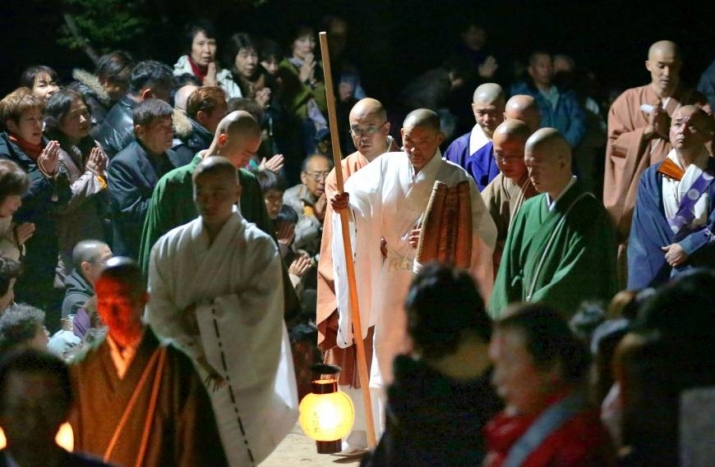NEWS
Japanese Monk Completes Nine-day Doiri Retreat Without Food, Water, or Sleep
 Buddhist monk Kogen Kamahori emerges at Enryaku-ji after completing his nine-day retreat. From japantimes.co.jp
Buddhist monk Kogen Kamahori emerges at Enryaku-ji after completing his nine-day retreat. From japantimes.co.jpA Japanese Buddhist monk last week completed a grueling nine-day ritual during which he recited the mantra of the Buddhist deity Achala 100,000 times—forgoing water, food, sleep, and even lying down for the entire period. Kogen Kamahori, 41, of the Tendai school of Buddhism, became the first person in Japan in eight years to complete the feat and only the thirteenth to do so since the end of World War II.
Around 600 people gathered to greet Kamahori, who is chief monk of Zenju-in, a sub-temple of the temple Enryaku-ji on Mount Hiei in southern Japan. Clad in a white robe and assisted by fellow monks, Kamahori emerged shortly before 2 a.m. on 21 October from a meditation hall at Enryaku-ji. After receiving a certificate of completion from Shukei Komori, a daisojo, or senior monk, he drank medicinal hot water and walked three times around the principal image in the hall.
The ritual, known as doiri (or entrance into the hall), is the most difficult ordeal in the seven-year sennichi kaihogyo training program, which also includes walking around the holy mountain on 1,000 non-consecutive days in a bid to achieve enlightenment. Kamahori, who began the training in 2011, had already completed the prescribed 700 days of walking before beginning his retreat, and is expected to walk the remaining 300 days by September 2017. The last person to complete the ritual challenge was a monk named Endo Mitsunaga.
Doiri is considered to be the most critical phase of the sennichi kaihogyo, and practitioners limit their food intake for several weeks beforehand in preparation. During the nine-day fast the practitioner may not eat, drink, sleep, or rest. By the fifth day of the retreat, the practitioner is dehydrated and is allowed to rinse his mouth with water, although he is still forbidden to consume any liquids.
The ritual is aimed at making the practitioner face the concept of mortality and physical death, engendering a renewed sensitivity to life. Originally a ten-day ordeal, the doiri was shortened to nine days after too many participants died during the retreat. It is also considered too dangerous to practice during the hot summer months.
Tendai is a Japanese school of Mahayana Buddhism related to the Chinese Tiantai, or Lotus Sutra, school, although it also incorporates some studies and practices associated with Vajrayana Buddhism. Tendai was brought to Japan from China by the monk Saicho (767–822) in 806, and has since become one of the most widely practiced forms of Buddhism in the country.
See more
Kamabori becomes 13th Buddhist priest to pass ‘doiri’ endurance ritual (The Asahi Shimbun)
Buddhist monk ends nine-day ritual without food, water or sleep (The Japan Times)
Monk becomes 13th person since WWII to complete demanding fasting and prayer ritual (The Mainichi)
Japan: Monk completes nine-day endurance test (BBC)
The Spiritual Athlete's Path to Enlightenment (Lehigh University)














